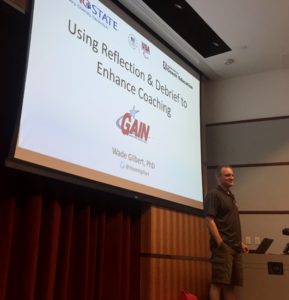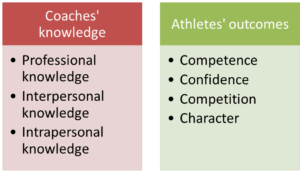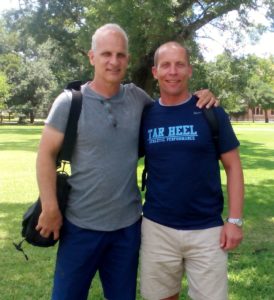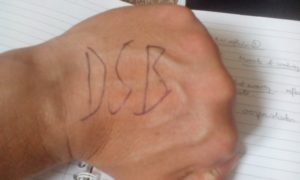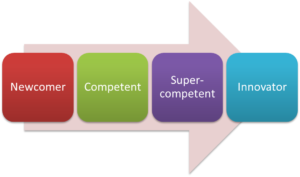Using reflection and debriefs to enhance coaching: Wade Gilbert
“Why wait for a disaster to have a really open and frank conversation?”
Wade Gilbert asked this at the GAIN conference in his presentation on reflection and debriefs for coaches. (This was two days after the Grenfell tower disaster where many people were asking the same thing).
Wade said that systematic reflection could be the separator between good and great coaches. He then took us through a series of exercises to help us start the process of reflection.
Exercise 1: What is quality coaching?
We wrote down one word that best captures what we think is the essence of coaching. We then held it above our head and looked for anyone else in the room with that same word (mine was empathy).
This exercise can be done with athletes too. It teaches the athletes to reflect in their training and realise that “you don’t just show up and have something done to you.”
Wade often refers to John Wooden, and he quoted from the “Wooden revisited” study. Almost everything that came out of Wooden’s mouth was teaching. He had an “economy of talk” with key instructions he used.
Wooden also had incredible attention to detail when planning his sessions.
Planning your sessions well and giving fewer instructions, but better ones, will improve the athlete experience.
Defining coaching effectiveness
Wade then quoted from a study he did with Jean Cote focussing on coaches’ knowledge.
It looked at 3 components:
- Coaches’ knowledge
- Athletes’ outcomes
- Coaching contexts
If the coaches’ knowledge doesn’t transfer to successful athlete outcomes then it is redundant. This knowledge was broken down into 3 areas and the outcomes into 4 areas.
(How many NGB coaching courses refer to the 2nd / 3rd areas of knowledge?)
By using reflection and debriefs the coach can become more self-aware and understand better their relationship with others.
(A few years ago I did an excellent course called Leadership through emotional intelligence which I recommend highly, “The Chimp Paradox” is also an excellent book to help you with this.)
Exercise 2: Coaching strengths and gaps
Here we worked in small groups and evaluated our strengths and gaps which were divided into the 4 parts of the season (see Wade Gilbert coaching process).
We then tried to find someone whose strengths matched our gaps and vice versa. I chatted to Greg Gatz (University North Carolina) about how to make our gym sessions “Game like and demanding”. We are going to share some fun challenges between our 2 groups of athletes to help create this at some point in the week.
This was a good opportunity to practice “purposeful and systematic reflection”. It was especially useful as we had been on “receive” mode for 4 days and time for reflection and discussion was most welcome.
Do Simple Better
This phrase became a bit of a mantra after GAIN. Rather than looking to add the “shiny new thing”, it was a reminder from Wade that doing the simple things better often worked wonders.
An example of how to improve practices is to write down “advanced noticing cues”: what everybody should be looking for at the beginning of the session. Look for leverage points that make a difference and.
This also makes athlete and coach evaluation easier and more pertinent because we have something to evaluate against: “did you manage to keep that bar close to your body?” “Did your hands and head make an equilateral triangle in headstand?”
Exercise 3: Post practice reflection sheet
We were given a checklist from Wade’s book which has 17 different questions to ask under 4 areas:
- Set challenging & specific practice goals.
- Keep athletes physically and mentally active throughout practice.
- Give athletes choice and ask them for input on practice design.
- Create competitive gamelike practice activities.
It is a simple tickbox exercise and can be done very quickly. I had Tom Hardy, one of my assistant gymnastics coaches, do one “live” on my coaching in one of our sessions. He picked up on 2 points that I had missed and so I adapted for the next session.
Critical Reflection
These simple exercises were useful and easy to initiate. Wade then said the next step was to “think about how we think”: meta -reflection.
The goal he set us was to “Understand and challenge mental models of coaching and athlete development.”
He quoted from John Medina’s “Brain Rules”: “we do not see others with our eyes, we see them with our brains”.
Deliberate reflection would allow us as coaches to move along this continnuum.
Part of the innovation process is “It’s okay not to finish things.” This may help retain information as proposed by the “Zeigarnik Effect”. Finishing a task then allows the brain to relax and switch to a new task. Having things unfinished may allow the brain to work subconsciously on solving the problems.
This seminar was a perfect way to spend the final Saturday morning of GAIN. Our brains had been filled up with new and challenging ideas and information, what matters most is how we can transfer that knowledge to athlete actions.
I have spent much more time focussing on scheduling tasks since this seminar 5 weeks ago. My idea is to do 1-2 things each month at different points of the season that will allow me to develop as a coach. This then will help the athletes at Excelsior ADC.
Thanks to Wade and Vern for facilitating this.
Further Reading:
- Jim Radcliffe and Vern Gambetta on Creating the perfect workout
- Summer: time for reflection?

